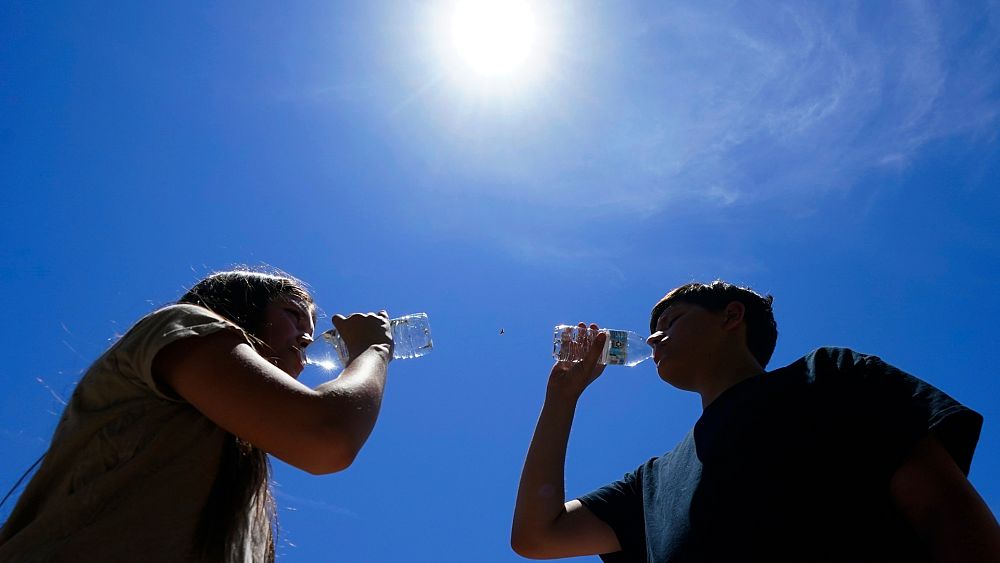
Experts say that if we don’t stop burning fossil fuels today, what we are experiencing now could become the new normal.
Meteorologists predict that Europe could hit its highest-ever temperature in the coming days with parts of Italy predicted to reach more than 48C. China has already breached its record with a searing 52.2C in the remote town of Sanboa on Sunday.
In the US, around 90 million people – 27 per cent of the country’s population – live in areas that are expected to see dangerous levels of heat this week.
The World Meteorological Organization (WMO) has warned that there is no immediate respite in sight from this “summer of extremes”. The UN meteorological organisation said that high temperatures around the world could continue into August.
But what is driving this extreme weather and is climate change to blame?
Is our weather getting more extreme?
Climate change doesn’t just mean things are getting hotter. Weather patterns are disrupted, leading to increased frequency and intensity of extreme events – particularly high temperatures and heavy rainfall.
According to Alvaro Silva, an expert from the WMO’s climate sciences division, an increasing number of studies demonstrate the connection between rapid warming and changes to essential weather patterns.
With the Arctic warming four times faster than the global average, research suggests that higher temperatures in this region are causing strong winds known as the jet stream to slow down.
“The jet stream becomes weaker and wavier when warm air is transported to the north and cold air to the south,” he explains.
“In these conditions, near-stationary weather patterns establish and lead to prolonged heatwaves and drought in some regions and heavy precipitation in others.”
The start of the El Niño weather phenomenon in June is only expected to amplify the frequency and intensity of these extreme events.
It means that waters in the Eastern Pacific Ocean are warmer than usual, supercharging extreme weather and – when combined with excess warming from climate change – bringing record-high temperatures.
“The development of El Niño, a natural phenomenon involving the release of heat from the Pacific Ocean, is also contributing some heat,” Dr Friederike Otto, senior lecturer in climate science at the Grantham Institute for Climate Change and the Environment, tells Euronews Green.
“But human-caused climate change is the main reason global temperature records are being broken.”
How do we know climate change is to blame?
Climate scientists use complex computer simulations to work out whether humans are causing extreme weather events to become worse.
In April this year, Spain, Portugal and northwest Africa suffered through another record-breaking heatwave. Spain saw its hottest-ever April temperature hitting 38.8C at Cordoba airport in the south of the country.
The three days of exceptional heat came on top of historic multi-year droughts across many of these regions.
Scientists from Morocco, France, the Netherlands, the US and the UK came together to assess what impact climate change was having.
They found that the heatwave event from 26-28 April was “at least 100 times more likely” because of the climate crisis. According to the research from World Weather Attribution (WWA), these extreme temperatures would have been “statistically impossible” in the absence of human-caused global warming.
While the data for heatwaves this July still needs to be analysed, research points to climate change as the cause.
An IPCC report from earlier this year confirmed that there has been an increase in the frequency and intensity of extreme weather events since the 1950s. A separate study of European heatwaves reveals that these events have become increasingly severe over the last two decades.
And the WWA says that the UK reaching highs of 40C in July 2022 would have been “extremely unlikely” without climate change.
Dr Otto says this heat is “unprecedented for humans” with Europe experiencing “longer, hotter and more frequent heatwaves because of human-caused climate change”.
“People can call it a ‘new era’ or ‘unchartered territory,’ but it is not a ‘climate collapse’ or ‘runaway warming.’ We still have time to secure a liveable future for many, but we need to rapidly phase out fossil fuels and reduce global emissions to net zero,” she explains.
Are we headed for a new ‘climate frontier’?
James Hansen, the US scientist who first warned the world about the greenhouse effect in 1980, has said it seems like we are headed for a “new climate frontier”.
“In testimony to Congress in 1988 and 1989, and in a paper attached to the 1989 testimony, we noted that global warming causes wet places to get wetter and dry places to get drier,” he writes alongside two other climate scientists in a statement released last week.
They say the world is now shifting towards higher temperatures than at any point in the last one million years.
“On global average, June 2023 was easily the warmest June in the historical record,” the statement reads.
These climate extremes also mean stronger storms, more intense droughts and heatwaves.
And scientists say this weather will only continue to become more frequent and more extreme as long as humans keep releasing greenhouse gases.
“If we’d stop burning fossil fuels today, what we are experiencing now would become the new normal,” says Dr Otto.
“But as long as we burn fossil fuels, the climate will continue to become hotter, and we will see extremes far hotter than this year.”
